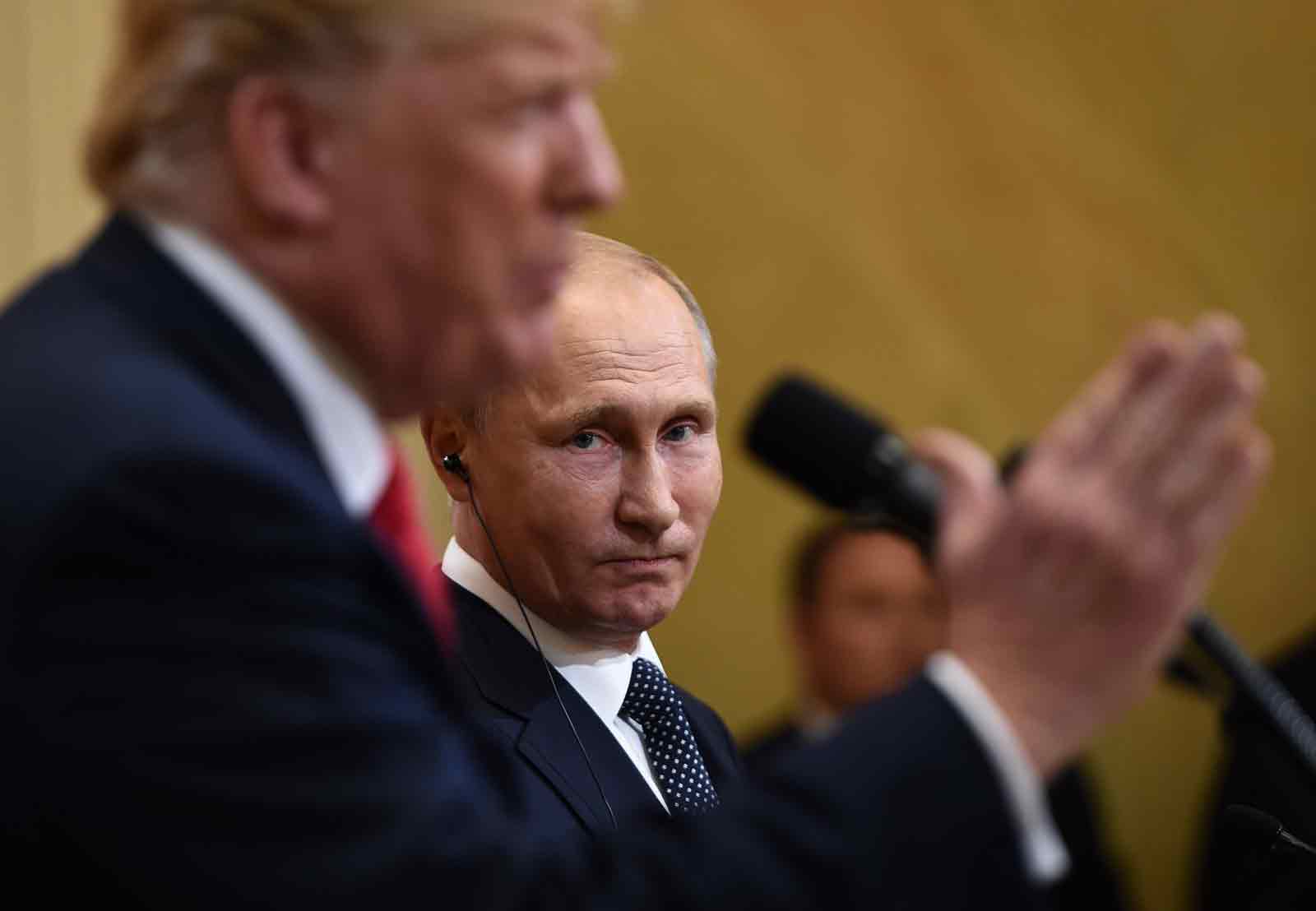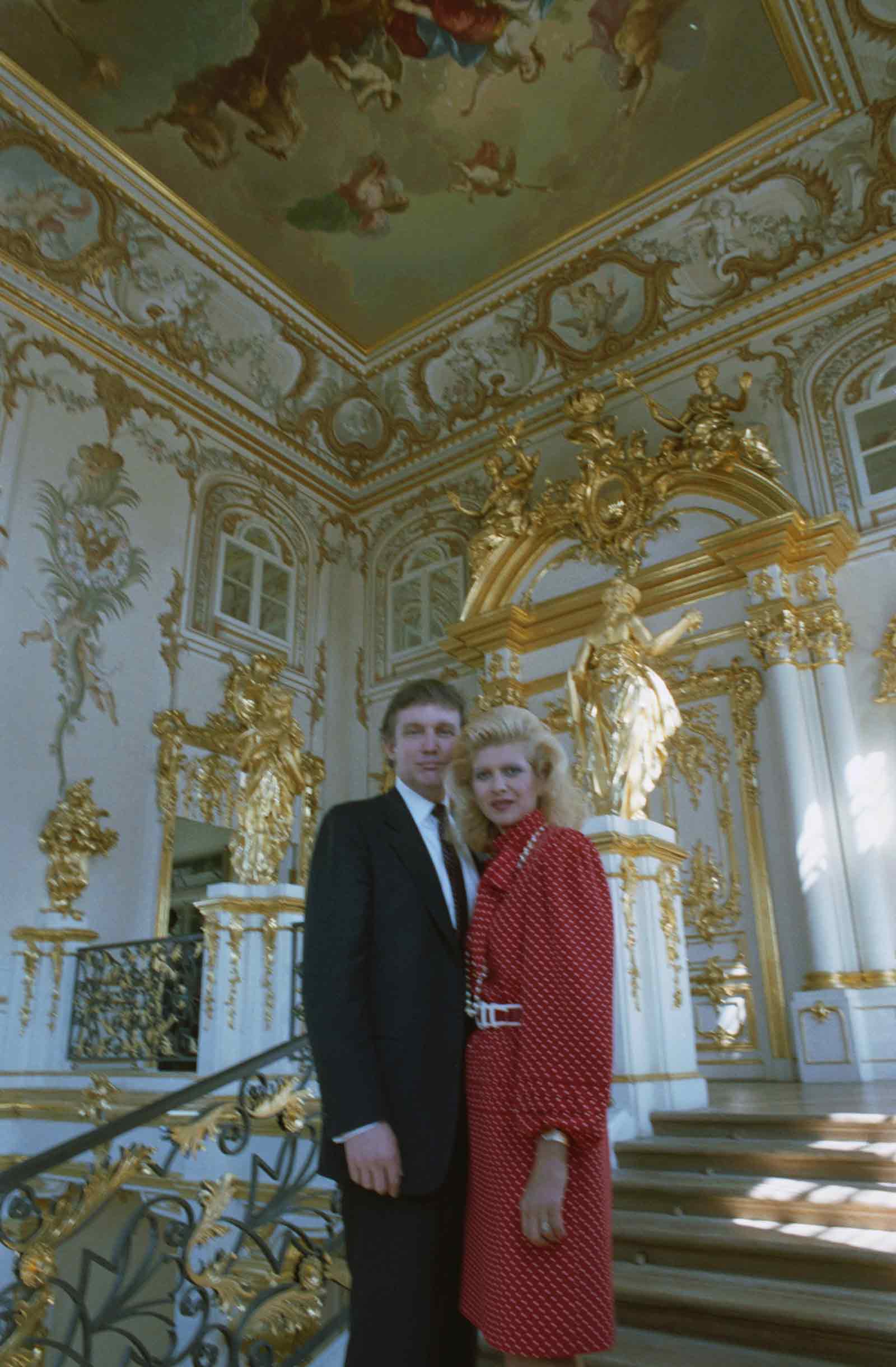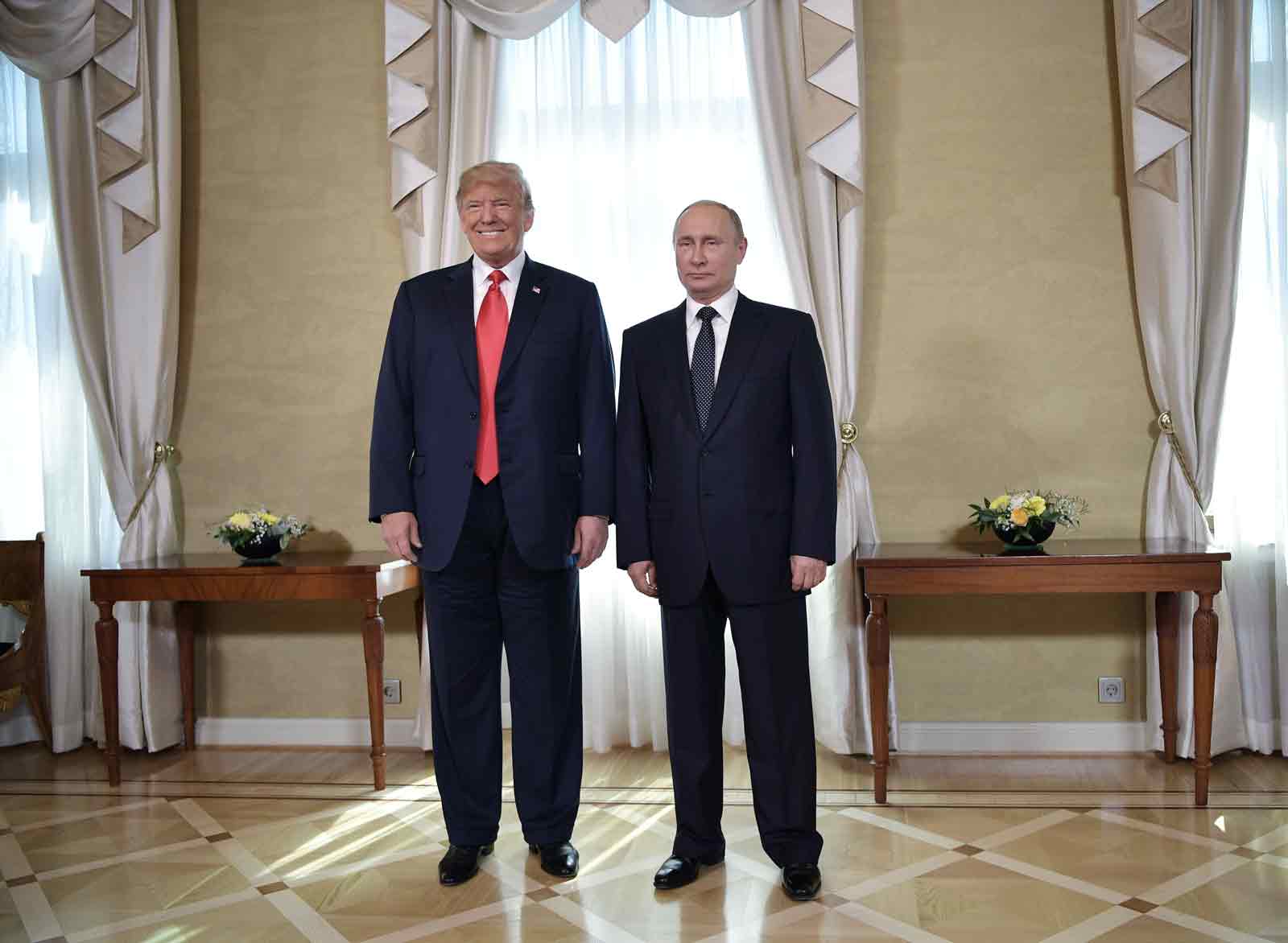In March 1986, Yuri Dubinin arrived in New York to assume his post as the Soviet ambassador to the United Nations. Dubinin’s daughter, Natalia, was already a diplomat serving at the Soviet mission, and she picked her father up at the airport and drove him into a city to which he’d never before been. (He wouldn’t stay long—within weeks of his arrival, Dubinin was reposted as Soviet ambassador to the United States and relocated to Washington, D.C.) Their first stop, Natalia told the newspaper Komsomolskaya Pravda, was a Tetris-like black skyscraper on Fifth Avenue. Professing himself impressed by what he saw in this monument to American capitalism, the graying apparatchik asked to meet its owner. So the Dubinins traveled to the top floor and were introduced to Donald Trump.
It was a mutually delightful encounter. “The first thing I saw in the city is your tower,” the ambassador exclaimed to the developer (it must have been an exceptionally cloudy day on the Grand Central Parkway). “Trump melted at once,” Natalia recalled. “He is an emotional person, somewhat impulsive. He needs recognition. And, of course, when he gets it he likes it. My father’s visit worked on him like honey to a bee.”
A year later, in 1987, Trump would visit Moscow for the first time. As his ghostwriter, Tony Schwartz wrote in The Art of the Deal—which, in fact, elides this encounter and places Trump’s first meeting with Dubinin at a lunch six months later—that Trump talked “about building a large luxury hotel, across the street from the Kremlin, in partnership with the Soviet government.” A few moments of preying upon Trump’s vanity had gotten him to Moscow; preying upon his greed would do the rest.
By this point, Trump was well known to Soviet intelligence. For a decade already, the Czech secret police, the StB, had maintained a file on him, following his marriage to Czechoslovakian native Ivana Zelníčková in 1977, and like other Warsaw Pact intelligence services, the StB was wholly subordinate to the KGB. And as the British journalist Luke Harding has observed, while Dubinin had no discernible ties to the Lubyanka, the FSB’s Moscow headquarters (formerly the KGB’s), that doesn’t necessarily mean that Natalia, who was serving on the Soviet delegation to the United Nations when her father arrived in New York, was purely a diplomat. In the Soviet era, as with Russia’s delegation today, the UN mission was rife with spies for both the KGB and GRU, Soviet military intelligence, many of them residing in the same building in the Riverdale neighborhood of the Bronx. Dubinin’s other daughter, Irina, later confirmed that her father’s express purpose was “to make contact with America’s business elite.”
That year was a propitious time to do so. Mikhail Gorbachev’s Perestroika reform program was just a year old, the first experiment with a market economy introduced by a law that authorized citizens to engage in “individual labor activity”—in other words, to become startup entrepreneurs. True, this measure only regularized parts of a black-market economy that had operated for years in Soviet society, benefiting the nomenklatura and security services especially. But that change was swiftly followed, in 1987, by another, small-seeming but significant blow to Marxism-Leninism: the transfer of Soviet “cooperatives” into private hands. Trump came to Moscow just as capitalism did.
“Here’s this rich American who’s bandied about loosely the idea of running for political office,” says Steven Hall, a former head of Russia operations for the CIA. “What that triggers on the side of the KGB is: ‘We’re going to collect on him. We’re not going to do high-level physical surveillance, but we’re going to collect on him, see where he stays, wire him, do some open source research. You never know where he’ll wind up.”
Russian spies are taught how to play the long game in the cultivation of assets, agents, or mere informants, whether at home or abroad. A less-than-chance encounter with a lowly but ambitious American defense contractor on a business trip to Brussels may yield top-secret US nuclear secrets decades later. The recruitment of a US military attaché stationed at the embassy in Tokyo could begin with answering his overworked secretary’s singles ad. Some investments will fizzle out (the defense contractor gets spooked and goes to the FBI; the attaché’s secretary gets reassigned), but others will pay off handsomely.
*
At that time, the twilight of the USSR, a good many KGB officers could not have known where they’d wind up. Some became extremely wealthy in their own right as beneficiaries of a nascent free market that still relied on the ancien régime’s old patronage networks and cronyism (blat and svyasi, in Russian). Others went on to serve as the security details or C-suite helpmeets of a new generation of industrialists, who modeled themselves on their Western counterparts. As David E. Hoffman notes in his superb account of this transformative period, The Oligarchs:
Advertisement
The new Russian tycoons also borrowed amply from a rich history of plutocracy in Europe and the United States. Although the Russian fortunes were relatively small—the top four Russian commercial banks in 1995 would have ranked a little higher than thirtieth in Italy—they nonetheless adopted the style and methods of the great robber barons, emulating their brazen deals, steely self-confidence, daring gambits, and superrich fantasies.
The oligarchs made their money out of the single largest transfer of state assets into private ownership in history. In many instances, they used public funds deposited in their banks to buy those assets, or issued the government loans that paid for shares in state properties whose actual worth was many times the size of the loans. It was corporate welfare at the very advent of private corporations in Russia, and on a grand scale—getting a city government, for example, to finance the construction of a hotel by agreeing to a forty-year tax abatement worth hundreds of millions of dollars.
These were cynical manipulators of men, markets, and government—akin, in Hoffman’s view, to the early-twentieth-century American capitalists rendered by Theodore Dreiser in The Financier and An American Tragedy. Unlike Dreiser’s fat cats, though, their scores were settled with car bombs and kompromat, which took the form of “fake news” as often as it did the exposure of actual secrets. In one inspired example, Boris Berezovsky’s ORT accused Moscow’s Tammany-like mayor Yury Luzhkov of having links with the Aum Shinrikyo, the Japanese doomsday cult that unleashed sarin gas in the Tokyo subway system, as well as with the Church of Scientology. No disinformation was too outlandish if it damaged an enemy.
Those who survived the wild early period of Russian capitalism then came to thrive as the state regained a degree of control with the transition of presidential power from Boris Yeltsin, a heart-attack-prone alcoholic, to a German-speaking KGB case officer named Vladimir Putin. Corruption became systematized and the unruly boyars became vassals. The new generation of oligarchs also went international, buying up European soccer clubs, entertaining on Mediterranean mega-yachts, and trading their empires’ shares on the London Stock Exchange. Scores came to be settled with PR firms and libel lawyers, rather than private armies. And Putin presided over all. It has been said that Roman Abramovich, the oligarch owner of Chelsea football club, only consented to getting a divorce from the second wife he cheated on in public under “pressure” from the Russian president,who saw such philandering as a stain on “family values.”
“Putin runs the country based on trying to keep the rich people rich and compromised so that if they step out of line, he can crush them,” says John Sipher, a former CIA officer who served in Moscow. The trick of this system is that the rich needn’t even be told that they’ve been compromised and that embarrassing details of their lives are kept in dossiers in the Lubyanka. The oligarchs simply assume that to be the case and act accordingly. The members of the Russian business elite are manipulated but uncontrolled assets whose outsize personalities and public profiles are best managed with a hands-off approach from the state.
“Look at [Yevgeny] Prigozhin,” Sipher adds, referring to an oligarch sanctioned by the US Treasury Department and indicted by the Justice Department for his sponsorship of the Internet Research Agency, a factory of online disinformation run out of St. Petersburg that fraudulently used social media, committing identity theft and financial crimes against Americans in the process, to help Trump and hurt Hillary Clinton in the run-up to the 2016 election. “He’s a restauranteur but can’t just be a billionaire and keep going. When the state comes to him and says, ‘We need you to run these troll farms or mercenaries in Syria,’ he’s not being ordered to do it, but at the same time, he can’t say no.” (Prigozhin also finances the Wagner Group, a paramilitary unit that has fought, with plausible deniability, on the Russian Defense Ministry’s behalf in both Ukraine and Syria.)
*
It is in this light that questions uppermost since the peculiar spectacle of the Helsinki summit—“What do the Russians have on Donald Trump?” or “Is Donald Trump an agent of Moscow?”—are better examined. An American oligarch is the best way to define how the Russian establishment and security organs view Trump, according to Steven Hall:
Advertisement
Since Helsinki, this has been firmed up in my mind. I’d be very surprised if Trump was a standard intelligence recruit, the type of guy who’d meet his handler under a bridge in Vienna and who’d be paid for influence. There’s almost a commercial aspect to how the Russians deal with him rather than an asset-running one. It’s a trusted relationship with someone they can nudge without having to instruct or order.
Burton Gerber, a thirty-nine-year veteran of the CIA and mentor to both Hall and Sipher, agrees with this assessment. The notion of Trump in certain precincts of the media as a Manchurian candidate, a Russian asset owned and run by the Kremlin, is ridiculous, he argues:
Trump is basically a man with low self-esteem, which he has worked against by being a bully and a narcissist. His actions scream, “Take me, I’m yours if you’ll admire and compliment me.” The Russians would never want to recruit him, just continuously have access to him and be able to influence him.
Gerber compares Trump to Harry Hopkins, an architect of the New Deal whom the Soviets cajoled because of his closeness to Roosevelt, rather than to Alger Hiss, whom the KGB actively recruited as a spy within the US government. “If you’ve got someone like Trump, an agent of influence,” he asks, “why would you then try to make him more than what he is? It would be irresponsible from an intelligence point of view.”
But how then to explain the Trump’s administration’s decidedly anti-Kremlin actions, such as the expulsion of some sixty Russian diplomats from the United States, the additional sanctions on Russia’s military-industrial complex and some oligarchs, and the Pentagon’s dispatching of Javelin anti-tank missiles to Ukraine? Hall believes that Moscow might have decided to take it all on the chin for the sake of preserving its special relationship with the president, seeing these policies as the collective yield of dutiful bureaucrats and national security advisers and congressmen prevailing upon a reluctant president to get tough. “Trump can easily apologize in private to the Russians,” he argues. “‘My guys told me we had to do this.’ And I can imagine the Russians responding, ‘We get it. We don’t love it, but we get it.’”
After Helsinski, a former Russian official told me that the Kremlin was actually worried now. They were expecting a statesmanlike and uneventful summit with platitudes but little by way of substantive agreements. However, so deferential was Trump toward Putin, the diplomat said, that the Russians were worried the White House or Congress would have no choice but to retaliate by passing more sanctions. (In the event, the president seemed to opt for threatening all-caps war with Iran on Twitter, perhaps to distract from his self-abasing performance in Finland and his own party’s embarrassment from it, which forced him to postpone a proposed follow-up meeting with Putin at the White House.)
Trump was reportedly livid that his Putin-hugging in Helsinki had not played better at home. Unlike Harry Hopkins, Trump cares nothing for social safety nets and is not motivated by ideology, only ego and a self-image as the great deal-maker, the ultimate winner. “The world is made up of people with either killer instincts or without killer instincts,” he told TV presenter Rona Barrett in 1980. “And people that seem to emerge are the people that are competitive and driven and with a certain instinct to win.”
Trump often sounds and behaves as if he rose to fame and fortune by hawking PCs or blue jeans on the pre-perestroika Moscow black market, not by being born a son to multimillionaire landlord in Queens. He came from inherited wealth but he behaves like a self-made member of the nouveau riche. His tastes are exorbitant but cheap; he is the poor man’s caricature of a rich man. Yet one can’t deny he has political cunning. As Putin’s political strategist, Vladimir Surkov, did for the Russian leader, Trump has created for himself a clever fairy tale about what a hero of our time looks like: an emblem of the establishment who partakes of all of its luxuries and perquisites while at the same time inveighing against it—half-jokingly, half-not—as a colossal racket, of which he, as a principal racketeer, has taken advantage. And if he can con the system, why can’t you? He turns up the music at Mar-a-Lago to stick it to the stuffed-shirts of Palm Beach, the sorts of people who owned the banks that refused to lend him any more money.
He has threatened journalists, financial analysts, and commentators with litigation for saying unflattering but true things about him or his businesses, not necessarily because he felt dishonored or insulted; sometimes, just because he wanted to show them who was boss. He once filed a $250 million defamation suit against Abraham Wallach, then a senior vice-president of First Capital Management, who said, correctly, on television that the Trump Organization had overpaid for its properties and that its CEO’s ego was driving the business to ruin. Trump then hired Wallach and dropped the suit. (Annihilation or cooptation was the choice offered to all oligarchs after 2000, following Vladimir Gusinsky’s public criticisms of Putin and his loss of his media empire to Gazprom.)
He cannot admit to accepting help, even from his own family. When he was about to default on his debts for the Taj Mahal, a lawyer bought $3-4 million in chips but placed no bets. This sum was very close to the amount the casino needed to make its first payment. Fred Trump, the father Donald Trump idolizes and whose virtues and business acumen he extols, was the man behind the bailout. Why couldn’t a wealthy father simply help his son financially, directly and out in the open? To do so would force an admission of defeat from someone with “killer instincts” to win. This explains why Trump compulsively denies and obfuscates what he knows to be true—that Putin helped him win the White House. “His fear, according to one of his closest aides who spoke on the condition of anonymity,” noted The New York Times on July 18, “is that any admission of even an unsuccessful Russian attempt to influence the 2016 vote raises questions about the legitimacy of his presidency.”
As Dubinin understood early on, Trump can brook no diminishment of his singular ability to achieve and accumulate. He will compliment anyone who flatters his self-perception, whether they run beauty pageants, discotheques, or Stalinist slave-states. His shamelessness is both a boon and a blight to a foreign intelligence service because he can breezily dismiss sexual and financial scandals as the sour grapes of envious enemies out to destroy him. This is why it doesn’t really matter whether or not the Kremlin possesses a tape of Trump cavorting with urinating prostitutes at the Ritz-Carlton, and it may not even matter if they possess reams of his elusive tax returns or documents leading to secret offshore bank accounts. The truest kompromat on Trump is his own personality. His amour propre, as it turns out, is Putin’s greatest alibi.





